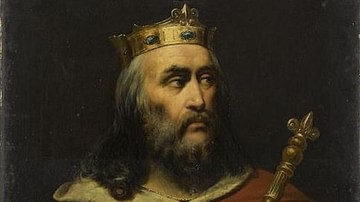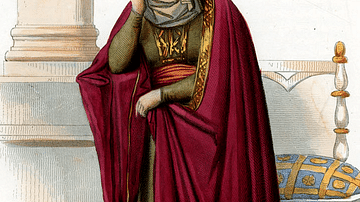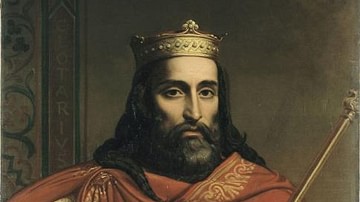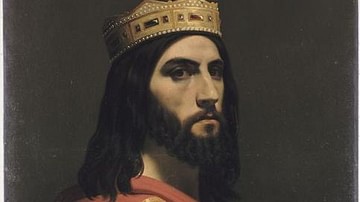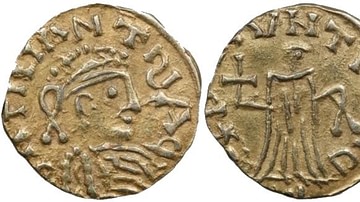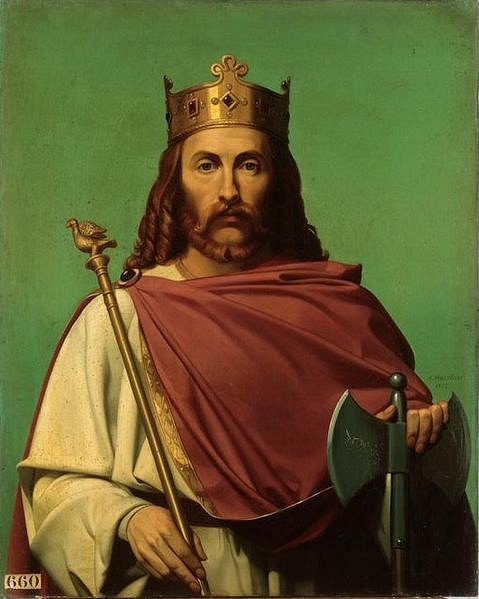
Chilperic I (r. 561-584) was a king of the Merovingian Dynasty, who ruled over the Frankish kingdom of Neustria. During his reign, Chilperic was often occupied with civil wars against his brothers and intrigues by his own sons, conflicts that were fueled by the rivalry between Chilperic's wife, Queen Fredegund, and her opposite number Brunhilda of Austrasia.
King Chilperic himself was regarded with disdain by the historian Gregory of Tours (c. 538 to c. 594), whose famous work History of the Franks is partially concerned with the period in which Chilperic ruled. Gregory, who personally dealt with Chilperic on several occasions, refers to him as "the Nero and Herod of our time" (VI. 45), though other contemporaries, such as the Latin poet Venantius Fortunatus, speak more highly of the king. Although Chilperic never ruled over a united Frankish kingdom in the manner of his father Chlothar I (r. 511-561) and grandfather Clovis I (r. 481-511), this feat would be accomplished yet again by his (alleged) son and successor Chlothar II (r. 584-629).
Early Life
Chilperic was probably born in 539, although some sources place his birth as early as 525. He was the only son born to Aregund, one of the wives of King Chlothar I of Soissons; Aregund's sister, Ingund, was also one of Chlothar's wives. It was said that Queen Ingund, after her marriage to Chlothar, despaired that her sister should remain single and asked her husband to find Aregund a suitable match. Once Chlothar laid eyes upon the beautiful Aregund, he decided that there was only one man in all Francia suitable to be her husband: himself. He shortly married her and was simultaneously husband to both sisters (Radegund, the sisters' first cousin, was also a wife of Chlothar).
In December 558, Chlothar became the ruler of a united Frankish kingdom and adopted the title 'King of All the Franks'. As his power expanded, so too did the size of his family; Chlothar had six wives, by whom he fathered at least seven sons. Since sibling rivalry had become something of a Merovingian family sport, Chilperic knew he had to prove himself if he was to follow in his father's footsteps. From a young age, he accompanied Chlothar on campaign, fighting alongside his father and half-brother Sigebert in the long and bloody campaign against the Saxons in 555. When another of Chilperic's half-brothers, Chramn, rebelled against their father, Chilperic joined Chlothar's campaign against him. Chramn was defeated in battle by Cholthar and Chilperic in late 560 and was burned alive for his transgressions.
As well as accumulating military experience, young Chilperic also had a passion for learning. He was a gifted horseback rider and was proficient in languages, knowing some Latin, Greek, and possibly even Hebrew in addition to his native Frankish. He composed books of poetry, which have since been lost (and, if Gregory of Tours is to be believed, were never very good), and was apparently well-versed in theology. Venantius Fortunatus wrote that Chilperic's learned disposition set him apart from other Merovingian kings, but it would take more than a book of poems to win his father's throne. When Chlothar I finally died during a hunting expedition in 561, Chilperic was put to the test.

Succession
As soon as news of his father's death reached him, Chilperic rode to Berny and seized Chlothar's treasury, which he planned to use to buy the loyalties of Frankish nobles. Then, he made his way to Paris, a city that had symbolized Frankish unity since the days of Clovis I. This was seen as a blatant power grab; Merovingian kingdoms were traditionally divided in equal parts between a dead king's sons, but Chilperic's aggressive actions suggested that he meant to take the whole kingdom for himself. However, it may have been the case that he was acting out of self-preservation. Chilperic was the only son of Aregund, while his three surviving half-brothers were all children of Ingund. He may have suspected that they planned to band against him and exclude him from the succession. By seizing Paris, Chilperic had a major bargaining chip that ensured he would receive a piece of the pie.
If this was indeed his plan, it worked. Although Chilperic was compelled by his brothers to share the kingdom with them, he received his share. Charibert I, the eldest brother, received the Kingdom of Paris as his inheritance. Guntram I, the next oldest, received the Kingdom of Burgundy, with Orléans as his capital, while Sigebert I inherited the eastern kingdom of Austrasia and took his seat at Rheims. Chilperic received the Kingdom of Soissons, the smallest and poorest of the four kingdoms. What was worse, while his half-brothers each bordered on foreign kingdoms which they could attack for land and plunder, Chilperic was boxed in on all sides by his brothers' lands. Frankish warriors, who were the backbone of any successful Merovingian king, needed land and plunder to keep them happy. With nowhere else to go, it was only a matter of time before Chilperic invaded his brothers' kingdoms.

An opportunity presented itself in 562 when Sigebert took his army east to campaign against the Avars. Chilperic gathered his forces and struck, occupying Rheims and the surrounding lands. Sigebert rushed back, retaliating by capturing Chilperic's capital of Soissons as well as Chilperic's eldest son Theudebert. Realizing he was bested, Chilperic was forced to make peace with Sigebert, and all occupied territories were returned. However, Chilperic would not have to wait long for another chance at expansion. In 567, Charibert died, and the Kingdom of Paris was divided between the three remaining brothers. Chilperic's power was greatly increased by his share of the land, and he now ruled over a large territory that would later be known as Neustria. The three brothers decided to split control of the city of Paris, and each swore an oath to never enter the city without the permission of the others.
Marriage & Murder
While all this was happening, the Merovingian brothers had started to take wives. Chilperic had married a woman named Audovera, by whom he had three sons: Theudebert, Merovech, and Clovis. He had also taken a serving girl named Fredegund as either another wife or as his mistress. Sigebert sneered at Chilperic's marriages to these lower-class women and sought to outdo him by marrying someone of his own social standing. Sigebert chose for his bride a lovely Visigothic princess named Brunhilda, daughter of King Athanagild.
This threatened Chilperic, both egotistically and politically, since Sigebert now had the Visigoths as allies. Not willing to be outdone, Chilperic arranged to marry Brunhilda's elder sister, Galswinth, and even agreed to set aside his current wives so that he could marry her. Galswinth arrived in Soissons after a lavish circuit throughout Gaul, and her new husband presented her with a colossal morgangabe, which was a gift given by Frankish nobles to their brides after their first night as a couple. This morgangabe included five cities, making it the largest of its kind in Frankish history. While there were likely political motivations behind the gift, it can be presumed that Chilperic did not lose the chance to rub Sigebert's nose in it.
But spite is not a great glue to hold a marriage together, and while Sigebert and Brunhilda's union proved fruitful in Austrasia, in Neustria, Chilperic's marriage quickly fell apart. Chilperic had welcomed Fredegund back into his bed, despite Galswinth's wishes to the contrary, and he found he could not entreat her to forgive the insult. The situation got so bad that Galswinth even asked to return to Spain, something that Chilperic could not allow. In 568, King Athanagild died, and the marriage lost its political significance. Not long after, Chilperic had a servant strangle Galswinth to death in her bed. Although Chilperic tried to mask his involvement by entering a period of mourning, the charade looked somewhat less sincere when he married Fredegund only days after Galswinth's death. It would prove a most consequential murder, one that sowed the seed for much of Francia's political turmoil for the rest of the century.
Civil War
From Paris to Spain, it was an open secret that Chilperic had killed his wife. Sigebert condemned Chilperic for the murder and demanded that he pay Brunhilda a weregeld, which, under old Germanic law, was a form of compensation paid by an offender to the insulted party. Sigebert insisted that this weregeld include the wealth and five cities that Chilperic had gifted to Galswinth. Failing this payment, Sigebert threatened to dethrone Chilperic. Chilperic took some time to consider before making his answer; in 572, he sent his son Clovis with an army to occupy the cities of Tours and Poitiers, which were in Sigebert's territory. A new round of civil wars had begun.
Sigebert initially allied with his brother Guntram, and the two sent an army to drive Clovis out of Tours. This was successful, and Clovis fled to his father's city of Bordeaux, which was soon lost to a revolt. In 573, after a council in Paris failed to solve the differences between the brothers, Chilperic sent another army into Aquitaine, this time commanded by his eldest son Theudebert. Theudebert handily defeated an Austrasian army in pitched battle before ravaging Sigebert's lands south of the Loire with particular brutality; Gregory of Tours records that the destruction wrought by Theudebert's army included the burning of churches, raping of nuns, and killings of clergymen. As the tide of war shifted in Chilperic's favor, Guntram switched sides in 574.
Sigebert, however, still had a trick up his sleeve. In 574, he allied with a group of pagan Germans from across the Rhine and sent them into Chilperic's lands. In 575, another Austrasian army was raised and sent against Theudebert in Aquitaine; this time, the Neustrians were soundly defeated and Theudebert was killed, his body despoiled by his enemies. Following this defeat, Chilperic fled to Tournai, where he holed up and prepared to make a final stand. Guntram switched sides yet again and sent men to join Sigebert in his advance toward Tournai.
For Sigebert, victory was within arm's reach. He was joined by certain Neustrian nobles who attempted to get in good with the apparent winner by declaring him king of Neustria, but as Sigebert passed through the town of Vitry with his army, he was attacked by two men with scramasaxes smeared with poison. Although Sigebert survived the initial attack, the poison did its work, and he died in agony a few days later. The assassination, which was widely believed to have been the work of Queen Fredegund, marked an end to the war. The Neustrian aristocracy transferred their allegiance back to Chilperic and handed over certain Austrasian officials, who were tortured to death.
With Sigebert's death, Chilperic moved to annex his kingdom. However, Sigebert's old vassals resisted him, knowing that their power would be diminished if Austrasia was partitioned. Instead, they crowned Sigebert's five-year-old son Childebert II as their king. Childebert's independence was guaranteed by King Guntram, and Chilperic begrudgingly stopped pressing the matter.
Rebellion of Merovech
While Chilperic had been busy warring, Queen Fredegund had given birth to three healthy sons. Naturally, she wanted the Neustrian throne to pass to her own children and eyed the sons from Chilperic's first marriage with contempt. One of these sons, Merovech, felt threatened by his stepmother and resolved to make a move; in 576, he married Sigebert's widow Brunhilda and ran away with her to Rouen. Chilperic viewed this as a challenge to his power and had Merovech captured, tonsured, and shipped off to a monastery.
Merovech soon escaped from the monastery and made his way to Tours, where he stayed for a time in St. Martin's Church under the protection of Gregory of Tours and waited for his hair to grow back (long hair was the mark of Merovingian kings). Eventually, Merovech left Tours with 500 men and attempted to reach Brunhilda by way of Burgundy. Here, he was captured by one of Guntram's dukes, but soon escaped and went into hiding near Rheims. In 577, Merovech received a message from the town of Therouanne, informing him that they had shunned Chilperic's rule in favor of his own. Delighted, Merovech made his way to Therouanne only to discover that it had been a trap; the townspeople kept him contained in a country house while they sent for Chilperic's troops. Realizing all was lost, Merovech ordered his servant to kill him.
An Heirless King
Merovech was not the only son of Chilperic to die that year; one of Fredegund's infant sons, Samson, also died, after a long illness. Samson's death was followed in 580 by Fredegund's two other sons, Clodebert and Dagobert, who were both lost to the same dysentery epidemic. Chilperic and Fredegund, who had prayed hard for their recoveries, were consumed by grief; however, this feeling was not shared by Clovis, who was now Chilperic's only surviving son.
Clovis was heard to have celebrated the deaths of his half-brothers, boasting that fate had made him heir to all of Gaul. This earned him the ire of his stepmother Fredegund. The queen captured a young girl who Clovis had been courting and tortured her into admitting that she had killed the young princes through witchcraft, at Clovis' request. Fredegund then had Clovis arrested and sent to an estate across the River Marne, where he was quietly dispatched. She then had Clovis' sister Basina sent to a convent and had their mother, Audroveda, murdered.
Through the death of Clovis, Fredegund consolidated her power but left her husband without an heir. In 581, Chilperic turned to his nephew, Childebert II of Austrasia, whose regents had fallen out with Guntram over a revenue dispute. Chilperic offered to recognize Childebert II as his heir in exchange for an alliance, which Childebert's councilors readily agreed to. The two began a joint attack on Guntram's lands in Aquitaine, but the conflict was deescalated when Guntram and Childebert II reconciled in 583.
Assassination
In 583, King Chilperic was at the height of his power and influence. He and Fredegund had had another son, Theuderic, who was baptized in Paris on Easter; Chilperic had entered the city in defiance of the oath he and his brothers had sworn in 567. That same year, Chilperic betrothed his daughter Rigunth to Recared, a prince of the Visigoths. The marriage was postponed when the infant Theuderic died in early 584, leaving Chilperic heirless once again, but on 1 September, Chilperic sent Rigunth off to Spain, accompanied by a huge entourage of servants, soldiers, and noblemen. Gregory of Tours records the horrific toll this procession made on the land, stealing food and provisions from the towns and fields in its path.
In the spring of 584, Fredegund gave birth to another son, named Chlothar after Chilperic's own father. Although some would later question the legitimacy of Chlothar's parentage, Chilperic was in desperate need of a son. As it happened, Chlothar was born not a moment too soon. In late September or October 584, Chilperic was off hunting at his manor of Chelles. One evening, he returned from the hunt around twilight and was in the middle of dismounting from his horse when a man stepped forward and stabbed him, first in the armpit and then in the stomach. The wounds were enough to kill the king, and as Gregory of Tours puts it, "that was the end of this wicked man" (VI. 45). The assassin was never identified, nor were his motives. With his death, Chilperic's four-month-old son was crowned as Chlothar II. As he had done for Childebert II, Guntram helped ensure Chlothar's independence during his minority.
Conclusion
Chilperic I was a ruler with a varied reputation. While Venantius Fortunatus praised his intellectual ability and military prowess, Gregory of Tours highlighted his brutality. "It is impossible to imagine any vice or debauchery this man did not practice," Gregory writes. "He was always on the watch for some new way of torturing his subjects. Whenever any were judged guilty of some crime or another, he would have their eyes torn out of their heads." (VI. 46)
Chilperic's greed is also noted by Gregory, who says that the king imposed oppressive and heavy taxes on his cities, and tore up wills that left money to bishops. Yet Gregory himself admits that Chilperic attempted to repent for this greed. The king saw the deaths of his two sons in 580 as divine punishment for his greed and attempted to atone by reducing taxes and making generous donations to the poor. He also tried to cultivate a reputation as an intellectual king; as well as his multiple books of poetry, Chilperic introduced four new letters into the alphabet, which were discarded after his death. He also tried to involve himself in theological matters, introducing his own interpretation of the Holy Trinity that was derided by Gregory.
No matter the nature of Chilperic's reign, it is clear that he ruled during a chaotic time, when the Merovingian kingdoms were perpetually at one another's throats, and when Gaul was constantly ravaged by civil war and disease. Chilperic's son Chlothar II and grandson Dagobert I (r. 623-639) would be two of the last effective Merovingian kings, before the dynasty's power became usurped by the mayors of the palace and, ultimately, by the Carolingian Dynasty.







